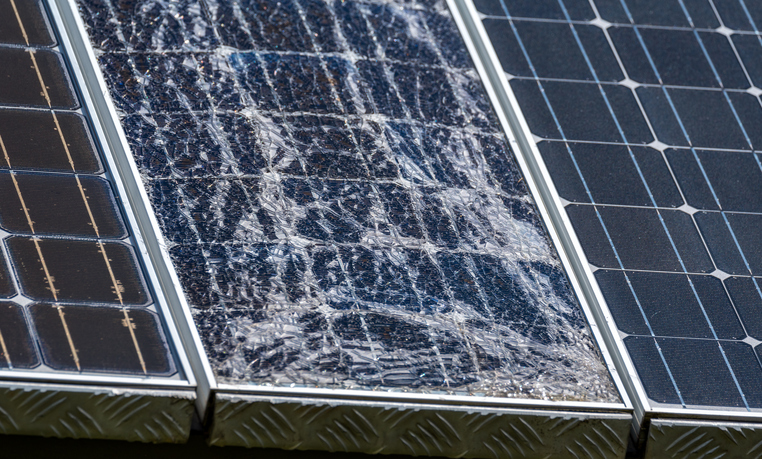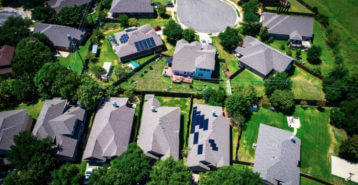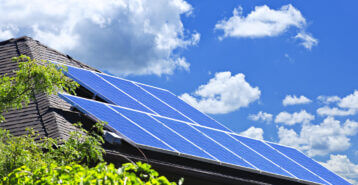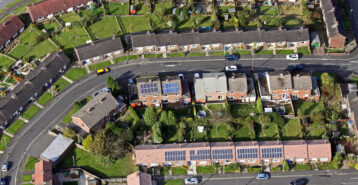Are you doing a solar project?
Modernize can pair you with three to four pros in your area, so you can compare options and save time and money.

Solar panel technology is ever-changing and improving — but it doesn’t make the panels impenetrable. Since the panels are made from outward-facing glass, they are vulnerable to damage from extreme weather and age. Water and hail damage to solar panels can feel like tricky problems to solve. Solar panels are built to last up to 20 years typically, but that lifespan can be shortened without proper care.
Here, we break down the most common causes of damage as well as the steps you can take to extend your solar panels’ lifespan.
Falling Debris Causes Damage to Solar Panels
Even the smallest debris, like twigs, leaves, or dirt, can cause small micro-scratches on your solar panels.
The scratches from fallen debris can dramatically lower your panels’ energy output. The scratches can hinder sunlight from shining directly onto the cells, and that decreases the amount of solar energy each panel is able to absorb. That, in turn, can raise your previously low utility bills, which is likely why you installed solar panels in the first place.
The heavier the debris, the more potential damage. Acorns and full branches, for example, can break panels completely.
The most logical solution is to make sure there are no trees directly overhead or in close proximity to your solar panels. But considering the benefits of having trees around your home, we know this isn’t as simple as it sounds. That’s why it’s important to maintain upkeep on your trees by having them regularly pruned.
Allowing debris to build up will significantly decrease the efficiency of your solar panels and lower the energy output. To get rid of the smaller debris on your solar panels, clean them regularly using a microfiber cloth and your garden hose — about once per season should be enough.
Hail Damage to Solar Panels
Hail storms can wreak havoc on your home and solar panels.
Unfortunately, there’s little you can do to protect your solar panels from damaging hail when a storm hits. So, if you live in an area that is inclined to experience a lot of hail, take preventative steps to avoid severe damage.
If one part of a solar panel is damaged, the energy output loss is considerable – almost as if you lost the entire panel. By installing more and smaller solar panels instead of fewer, larger ones, you can reduce the loss of energy output caused during a hail storm. While they are more costly to install initially, they cost less to replace individually than larger panels.
Water Damage to Solar Panels
Water damage from deteriorated or old seals is another common pain point for solar panel owners.
This is similar to insulation or sealing issues with window panes. As the sealant ages, it becomes less effective and allows water to leak through. When this happens, it can lead to short-circuiting and may degrade the components of your solar panels.
To best avoid water damage, take the time to reseal each panel or have a licensed solar panel contractor do this for you. Upon inspection, an expert will also be able to gauge if anything else can be done to maintain your solar panels.
Find the Right Contractor for Your Solar Project
Whether you’re ready to begin your project now or need some expert advice, our network of contractors are here to help. With a few simple questions, we’ll find the best local professionals for you
How Can I Detect Damage to Solar Panels?
Experts recommend checking on your solar panels at least once a month. That’s because even minor issues can add up over time and cause issues in efficiency.
Your physical inspection of solar panels should consist of checking the top for cracks that would potentially allow water inside.
Each panel is tested before installation — typically while it’s still at the factory. Still, sometimes short-circuiting still happens. Short-circuiting is usually caused by manufacturing defects and will occur when exacerbated by strong winds or rain. Ask your contractor if your warranty would cover issues like this and then consider purchasing an extended warranty to protect you in the future. It’s also important to check the underside of your solar panels for damage, displaced wires or wear from animals.
Troubleshooting Solar Inverters
If you’re experiencing problems with your solar panels but you don’t see any damage, call your solar contractor.
They will come out to inspect your solar panels, as well as the inverter — the device that converts direct current (DC) electricity — to make sure everything is still connected and charging properly.
Checking the solar inverter can help determine your solar power’s efficiency and if things have changed over time. Sometimes the issue is as simple as a replacement when the battery terminals wear out or fuses blow.
Can I File an Insurance Claim for Solar Panels?
Solar energy systems and solar panels are typically considered to be a permanent attachment, and in turn, insurance for them is included in most homeowners insurance policies.
For that reason, most standard policies will cover solar panel issues. Still, there are caveats depending on the system and the repair needs. For that reason, at times an additional add-on policy may be required. We recommend consulting with a licensed solar panel contractor before filing a claim or moving forward with any repairs or replacements.
If a Solar Panel is Damaged, Can it be Repaired?
Proper maintenance along the way and minor repairs can help keep a solar panel system functioning properly.
However, some issues are too lofty to fix without a complete replacement.
For instance, if a solar panel is damaged, it may still work, but will not function the same way it once did. If a solar panel experiences a big break, the whole panel will need to be replaced.
Additionally, solar inverters — which have shorter life spans than solar panels — will also need a full replacement eventually to keep your system running efficiently.
Ready to install solar panels or get your existing ones repaired? Modernize can help.
Find the Right Contractor for Your Solar Project
Whether you’re ready to begin your project now or need some expert advice, our network of contractors are here to help. With a few simple questions, we’ll find the best local professionals for you
Reviews from Real Homeowners
Welcome to Homeowner Resources! We are the Modernize blog. Modernize pairs more than 3 million homeowners a year with pre-vetted contractors in their area. This blog started because we believe homeowners should know everything about their homes, from how their HVAC works to which front door colors they might love. On Homeowner Resources, you can find information on every part of your home, right down to how you can negotiate with contractors to get the best price. Here's more about the blog.
Need a contractor? Learn more about how Modernize finds the right pro for you.




